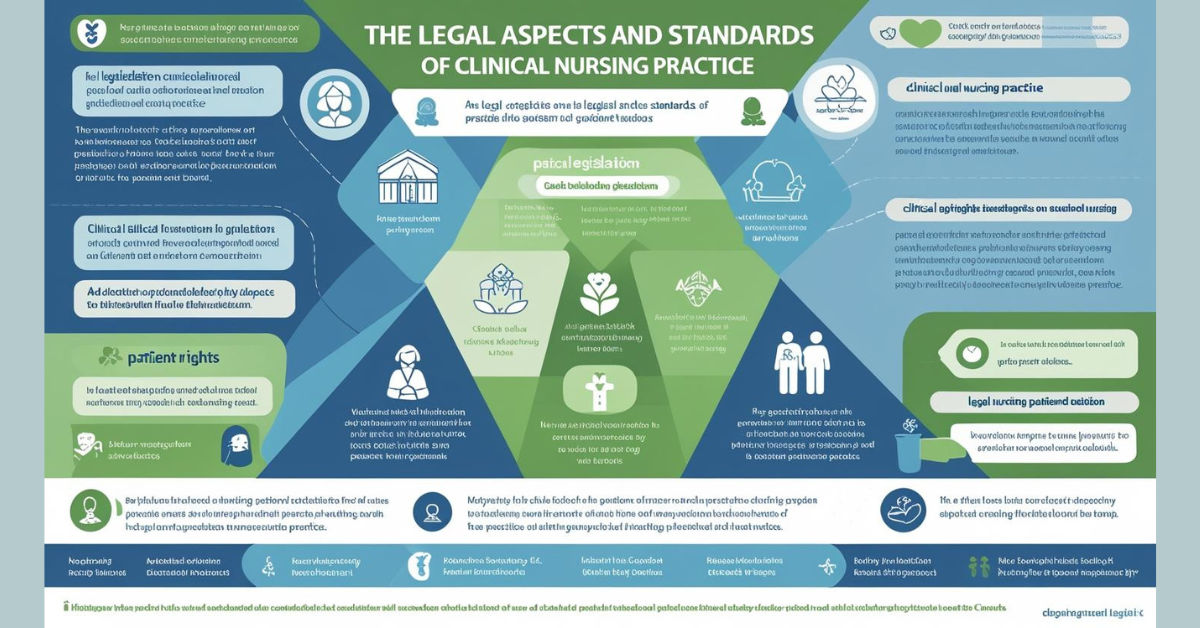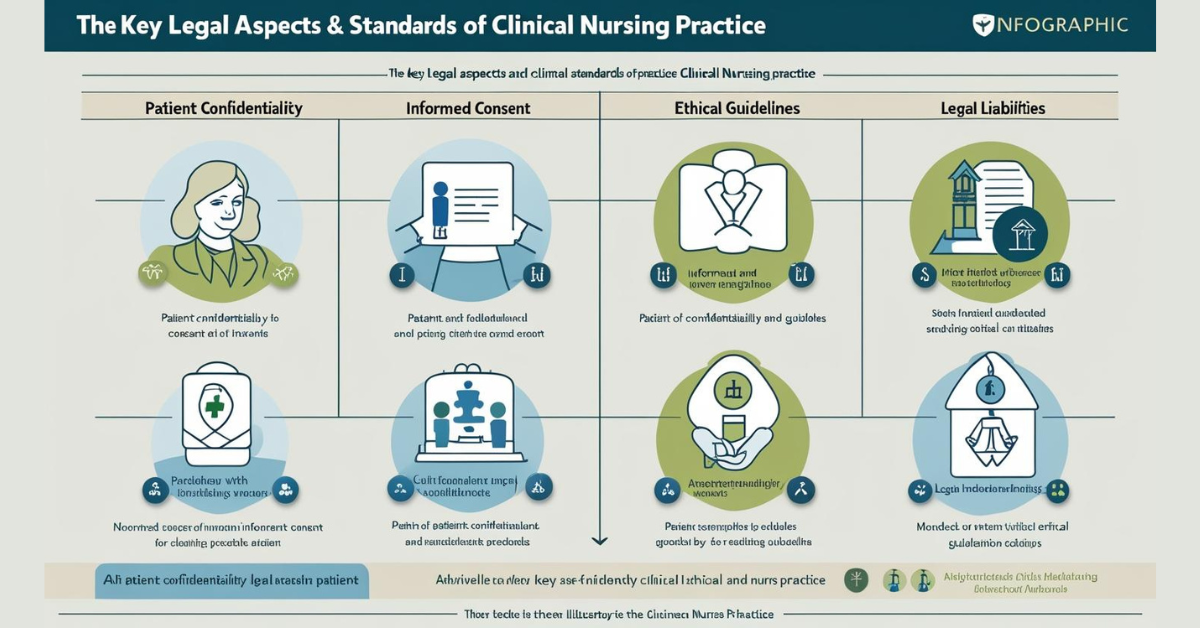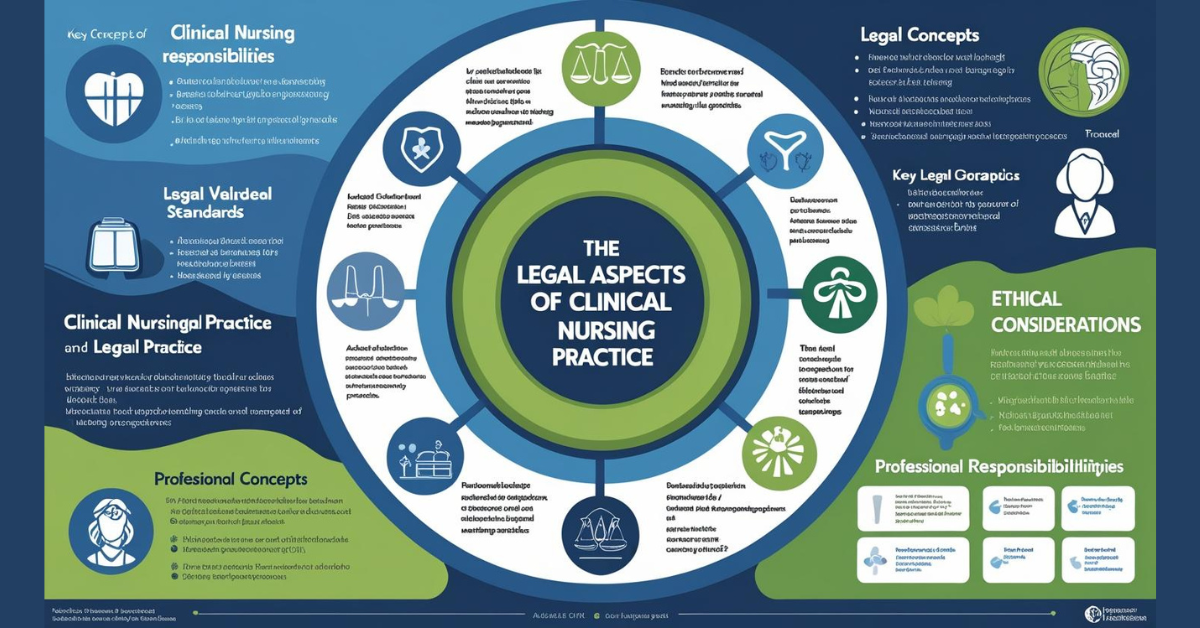What are Legal Aspects and Standards of Clinical Nursing Practice. Nurses may face ethical dilemmas in practice that require careful consideration and decision-making.
The Legal Aspects and Standards of Clinical Nursing Practice
The legal and ethical aspects of clinical nursing practice are critical to patient safety, maintaining professional standards, and preventing legal issues. Nurses must know their scope of practice, comply with relevant laws and regulations, and understand ethical principles such as autonomy, beneficence, and justice. Legal and ethical considerations guide nurses in providing safe, competent, and responsible care.
Key Legal Aspects
Scope of Practice
Defines the duties, responsibilities, and boundaries of nurses. This includes assessing patient condition, developing care plans, administering medications, and providing patient education.
Legal Liability
Nurses can be held liable for negligence, medical malpractice, and other legal issues.
Common Legal Issues
These include invasion of privacy, assault, and defamation.
Informed Consent
Nurses must ensure that patients understand procedures and treatments before obtaining their consent.
Documentation
Accurate and timely documentation is essential for legal protection. Laws and regulations: Nurses must be familiar with relevant laws, such as the Human Organ Transplantation Act, the Medical Termination of Pregnancy Act, and the Biomedical Waste Disposal Regulations.
Legal Aspects of Nursing Practice
Nurses at all levels must engage in responsible and accountable nursing practice. Further, nurses have authority, accountability, and responsibility to make decisions that result in safe, quality, and evidence-based nursing practice (ANA, 2015a, 2015b). Accountability is “to be answerable to oneself and others for one’s own choices, decisions and actions as measured against a standard” (ANA, 2015a, p. 41), such as those established by the ANA Code of Ethics for Nurses With Interpretive Standards, the ANA Nursing Scope and Standards of Practice, and state nurse practice acts (ANA, 2015a, 2015b).
To be accountable, nurses at all levels must embrace an approach to nursing practice that includes application of ethical principles; respect for the dignity, worth, and autonomy of patients; adherence to the scope and standards of nursing practice and legal and regulatory agencies; and fulfillment of society’s need for conscientious and qualified nurses (ANA, 2010, 2015b).
Nurse leaders and managers must have a complete understanding of the mini mum standards of clinical practice, the requirements of licensure, regulations that impact nursing, federal and/or state legislation in place to protect both health-care workers and their patients, classifications of law that relate to nursing practice, and malpractice. Additionally, nurse leaders and managers are responsible and account able for ensuring their nursing staff members have the knowledge, skills, and attitudes necessary to perform their professional responsibilities.
Standards for Clinical Practice
All nurses must be aware of the minimum standards of care for nursing practice. There are four foundational resources that provide registered nurses in the United States with the critical knowledge needed to inform clinical decision making and guide professional nursing practice. First is the nurse practice act of the state in which a nurse practices, discussed in greater detail in the next section, “Licensure and Regulation of Nursing Practice.”
Second is the ANA Code of Ethics for Nurses With Interpretive Statement (2015a), which is discussed earlier and details the ethical standards for nurses in all roles and in all settings. The last two resources are Nursing’s Social Policy Statement: The Essence of the Profession (ANA, 2010), which describes nursing’s commitment to society and provides a definition of nursing, and Nursing: Scope and Standards of Practice (ANA, 2015b), which presents the standards of professional nursing practice and accompanying competencies.
Nursing’s Social Policy Statement: The Essence of the Profession
Nursing’s Social Policy Statement: The Essence of the Profession defines nursing as “the protection, promotion, and optimization of health and abilities, prevention of illness and injury, alleviation of suffering through the diagnosis and treatment of human response, and advocacy in the care of individuals, families, communities, and populations” (ANA, 2010, p. 10).
Further, it describes the role of professional nursing in society and health care and provides an overview of the essence of nursing practice. The profession of nursing has a contract with society that grants the profession authority and reflects nursing’s core values and strong code of ethics. This social contract identifies the profession’s active leadership role related to the following six social concerns (ANA, 2010, p. 4–5):
- Organization, delivery, and financing of quality health care
- Provision for the public’s health
- Expansion of nursing and health-care knowledge and appropriate application of technology
- Expansion of health-care resources and health policy
- Definitive planning for health policy and regulation
- Duties under extreme conditions
Nurse leaders and managers can use Nursing’s Social Policy Statement as a foundational resource to reinforce with nursing staff on a regular basis the concepts of autonomy and competence, the scope and standards of nursing practice, and the nursing process. In addition, this resource can provide a basis for developing a unit vision, mission, and philosophy, as well as strategic planning.
Nursing: Scope and Standards of Practice
To provide a complete picture of the dynamic and complex nature of nursing practice, the “who, what, when, where, why, and how” of nursing practice must be detailed (ANA, 2015b). Nursing: Scope and Standards of Practice answers each of these questions and “describes a competent level of nursing practice and professional performance common to all registered nurses” (ANA, 2015b, p. 1). This document delineates the professional scope and standards of practice and responsibilities of all registered nurses in all settings and serves as a basis for the following (ANA, 2015b, pp. 49–50):
- Quality improvement systems
- Health-care reimbursement and financing methodologies
- Development and evaluation of nursing service delivery systems and organizational structures
- Certification activities
- Position descriptions and performance appraisals
- Agency policies, procedures, and protocols
- Educational offerings
- Regulatory systems
- establishing the legal standard of care
Nurse leaders and managers rely on the Scope and Standards of Practice to ensure that staff members provide safe and competent care.
Read More:
https://nurseseducator.com/didactic-and-dialectic-teaching-rationale-for-team-based-learning/
https://nurseseducator.com/high-fidelity-simulation-use-in-nursing-education/
First NCLEX Exam Center In Pakistan From Lahore (Mall of Lahore) to the Global Nursing
Categories of Journals: W, X, Y and Z Category Journal In Nursing Education
AI in Healthcare Content Creation: A Double-Edged Sword and Scary
Social Links:
https://www.facebook.com/nurseseducator/
https://www.instagram.com/nurseseducator/
https://www.pinterest.com/NursesEducator/
https://www.linkedin.com/in/nurseseducator/
https://www.researchgate.net/profile/Afza-Lal-Din
https://scholar.google.com/citations?hl=en&user=F0XY9vQAAAAJ



For most up-to-date information you have to pay a quick visit world wide web and on the web I found this website
as a finest web site for most up-to-date updates. https://Glassi-app.blogspot.com/2025/08/how-to-download-glassi-casino-app-for.html